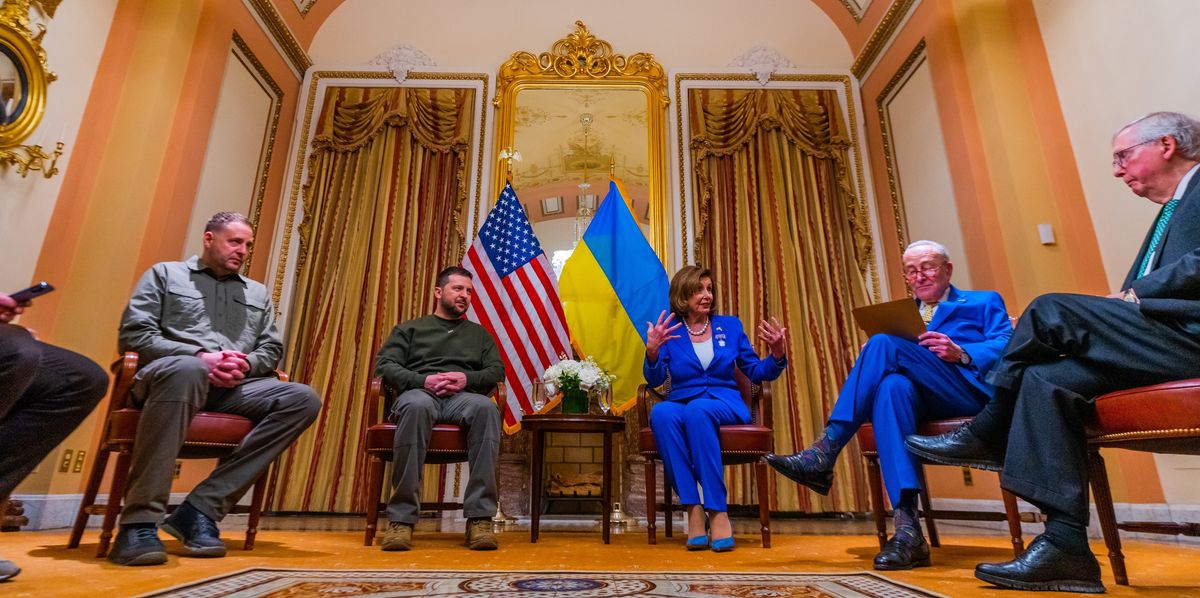U.S. aid for Ukraine has run out, and President Joe Biden’s proposal for more has been held up in Congress since he unveiled his national security supplemental — last October. This week, however, could be pivotal for the future of Washington’s funding of Ukraine’s nearly two-year war with the Russians.
The approximately $100 billion proposal — which includes roughly $60 billion in aid for Ukraine, $10 billion for Israel, and the rest for Taiwan and border security — has been stuck due to the two parties’ inability to reach an agreement on questions surrounding border security and immigration policy.
Sens. Chris Murphy (D-Conn.) and James Lankford (R-Okla.), who have been leading the negotiations, have reportedly held a series of meetings in recent days, while Biden met with Congressional leadership last week to discuss the supplemental. There appears to have been some movement, as Murphy, as well as Senate leaders Mitch McConnell (R-Ky.) and Chuck Schumer (D-N.Y.), have sounded optimistic notes about reaching an agreement in the near future — though a final bill text does not yet appear imminent.
But even if the Senate manages to strike a deal on border security, there is no guarantee of sufficient support in Congress to pass the rest of the supplemental, and most importantly, the Ukraine aid.
“There’s still majority support in Congress for Ukraine funding thanks to Democrats and GOP hawks, but it’s unclear if a majority of House or Senate Republicans would back it,” Punchbowl News reported on Monday. “So even with a border security plus immigration deal in hand, there’s no way lawmakers will greenlight Biden’s $60 billion request. The White House will have to narrow it to just military aid; financial or economic support for the Ukranians — as vital as it may be — won’t have any chance of passing.”
Following the request by a group of Senate Republicans, led by Sen. Ron Johnson (R-Wis.), the GOP conference will meet on Wednesday to discuss their position on Ukraine aid. While the Senate has typically been more in favor of funding Kyiv’s war effort than their counterparts in the House, the Punchbowl News report suggests that some of that support might be eroding.
The House is out this week, but, once they return, the situation promises to be even more complicated.
Rep. Johnson has said that he is open to considering the aid package but that border security is the top policy priority for the Republican caucus right now. In addition, the speaker, who prior to assuming a leadership role consistently voted against Ukraine aid, said that he understood the importance of supporting Kyiv but would only do so under certain conditions.
“We need the questions answered about the strategy, about the endgame and about the accountability for the precious treasure of the American people,” he said last week.
Meanwhile, the House Republicans who have been staunchly opposed to sending more aid to Ukraine insist that they will go to great lengths to prevent such a bill from getting a vote.
Rep. Marjorie Taylor Greene (R-Ga.) told Axios last week that she would introduce a “motion to vacate” against Speaker Johnson if he allows another round of Ukraine funding to pass. Some Democrats have suggested that they would vote to save Johnson’s job in such a circumstance — if he allows the supplemental to pass.
The Speaker is unquestionably navigating tricky political waters here. As Politico put it this weekend: “There are a million reasons why this idea will probably never come to pass. For one, Johnson is very unlikely to ever go there. He’d utterly ruin his relationship with Trump — not to mention alienate large swaths of his own conference by relying on Democrats to keep his job.”
Making matters even more complicated, a number of congressional Democrats have begun to express their uneasiness with Washington’s unconditional support for Israel’s ongoing war on Gaza. Following the first serious attempt on Capitol Hill to scrutinize Israel for potential human rights abuses, 18 Senators announced their support for an amendment to the national security supplemental that would require “that the weapons received by any country under this bill are used in accordance with U.S. law, international humanitarian law and the law of armed conflict.”
“The American people should feel confident that every country that receives U.S. military assistance is held to a standard consistent with our values,” said Sen. Tim Kaine (D-Va.) in a statement. “This amendment underscores that we expect any country that receives U.S. assistance to follow international laws of war and take measures to protect innocent civilians caught in conflict zones.”
Given that many of the cosponsors are allies of Biden and strong backers of Kyiv’s war effort, it seems unlikely that they would sink the supplemental if the amendment fails.
Nonetheless, the path to passing this legislation is filled with roadblocks and question marks. Biden has implored Congress to approve his proposal as soon as possible, but even as incremental progress is made, final passage still appears to be a ways away.
- Republicans balk at Biden plan to put Israel, Ukraine - and Taiwan? - aid to one vote ›
- House votes to avoid govt shutdown, but no Ukraine, Israel aid ›
- Pass Ukraine aid, but make it conditional on ending the war | Responsible Statecraft ›
- Ukraine, Israel & Taiwan aid now heads to a fractured House | Responsible Statecraft ›
- Is Mike Johnson playing chicken with detractors over foreign aid? | Responsible Statecraft ›














